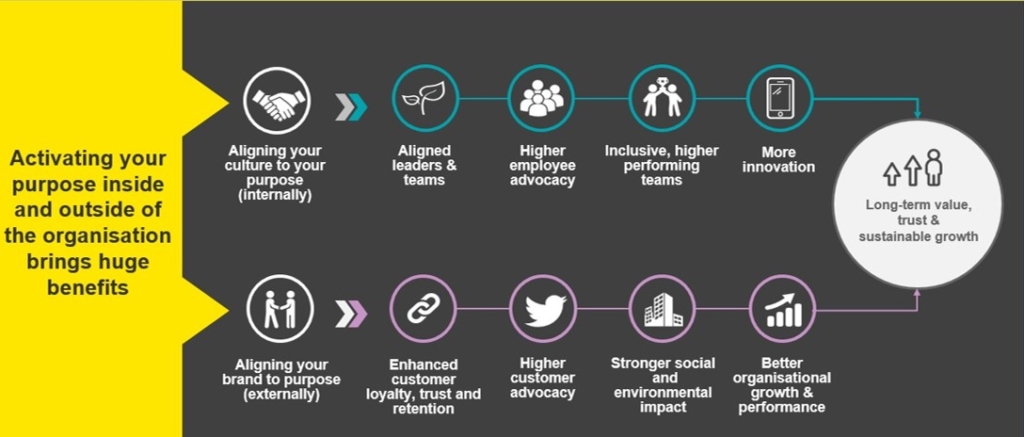Train people well enough so they can leave, treat them well enough so they don’t.
With Ireland heading towards full employment and the average millennial expecting to move jobs every two years, this quote from Sir Richard Branson appears more salient than ever. As a result the requirement to understand how to retain the talent you have and develop the talent you need has never been more important.
The fourth industrial revolution is currently shaking up every facet of society and the workplace is no different. It’s shaping the nature of work, how people are working and what type of work they are performing. A shifting generational mind-set is also influencing why people work and who they will choose to work for. In order for new talent strategies to be effective, they must align with these organisational trends.
In an environment where well-educated graduates have their choice of employers, what are the reasons they would choose to work in banking? Have financial services organisations invested sufficiently in their employee value proposition, do they offer a compelling employee experience that matches their customer experience, is there a focus on continuously developing that growth/learning mind-set?
Banks are long established and typically have employees that are long tenured. This can lead to a culture and structure that’s deep rooted and perhaps not fully reflective of what millennials and Gen Z are currently seeking.
In this context, we believe the key challenges facing financial institutions in 2019 are:

Solution
In order to counteract these challenges, financial institutions will need to create purposeful and personalised experiences for employees, with constant opportunities to learn.
74% of new graduates agree that business has a responsibility to create a better world and they want to see how their role is linked to this. Whilst improving work/life balance for employees is important, there is a growing shift to ensuring that roles have a clear purpose. Employees want to feel their work is meaningful, that they are making a difference e.g. helping a vulnerable customer with gambling addiction issues through the use of open APIs. This is a great example of how a new skillset required in Banks as a result of open banking, can be clearly linked to making a societal difference.
As well as roles having a clear purpose, when organisations place purpose at the heart of what they do, it can foster an environment where cultural transformation and accountability can thrive. For example, physical and financial well-being are the fundamental principles for Discovery Bank in South Africa – the world’s first behavioural bank. The bank uses financial incentives to help customers curate and sustain healthier lifestyles as well as showing how people can benefit from being financially healthy. Discovery Bank is reimagining how a financial institution and its customer can mutually benefit from greater financial well-being.
The way an organisation is designed and functions is critical not only to its effectiveness but also to the engagement and retention of its employees. The world is more demanding. Organisations are required to deliver quick solutions to increasingly complex and diverse problems. A hierarchal structure is not effective at producing these solutions and people working within these constraints will often feel stymied and ultimately disengaged. In the past employees were given tasks, which they learned by rote without needing to know or understand why. It was left to the managers to do the thinking. With the complexity of today’s problems however, this is no longer plausible. Leaders in financial institutions need to create conditions where multi-disciplinary teams with empowered decision making can act as this collective brain. Not only will this approach be liberating for staff but it is also likely to be beneficial for the customer. Have you ever considered how many steps in the hierarchy an employee has to go through, to get to the people they need to make a customer happy? Technology is now allowing some organisations to perform this kind of deep analysis on the touch points in their hierarchy and the findings are revealing.

Finally, giving employees access to continuous learning opportunities is now an essential attribute of any modern organisation. Changes in operating models, technology and multi generational workforces mean there is a constant requirement for people to learn new skills. With an increasing emphasis on equipping employees with soft skills such as: leadership, curiosity, critical thinking, inter-cultural awareness and judgement.
Employees need to remain in learning mode so their skills don’t lose currency. This requirement needs to be rooted in the organisational strategy with the aim of creating a culture of end to end learning. Without this, there will simply not be the talent available to allow financial institutions to react to the ever changing landscape. Learning needs to be convenient (mobile enabled), tailored to the individual and centred around the working day. The career path of future employees is changing from climbing a ladder to moving through a series of learning experiences.
The impact of a highly engaged workforce on an organisation is hard to overstate. It has been shown that a 5% increase in employee engagement correlates to 0.7% increase in operating margin. Similarly, if employees buy into a company’s purpose and the culture enables them to live it, not only will they thrive but customers trust in the company will also increase (see Fig 1 below).

Conclusion
As the current industrial revolution moves us from mass production to mass customisation, so the strategy for engaging the workforce and developing talent becomes increasingly about the individual. The financial services organisations that will thrive in this new environment will be those that truly understand their customer and their employees and put them both at the heart of all of their business decisions. Improving employee experience and customer experience are becoming two sides of the same coin.
The talent strategy of a financial institution in 2019 is no longer an HR issue, it is one of the key strategic issues. Although talent is a priority in every business sector, the value of a financial institution’s workforce will hinge on the effectiveness of the business strategy and how talent is deployed within that strategic framework. Leaders considering significant business model changes in order to remain relevant for the future will need to align workforce strategy with those goals.
This article is part of our NextWave Banking series which brings you our latest views on the decisions banks are facing in order to shape their digital future. In the coming weeks, we will be further exploring these challenges and the associated strategic options and emerging trends. Watch this space.